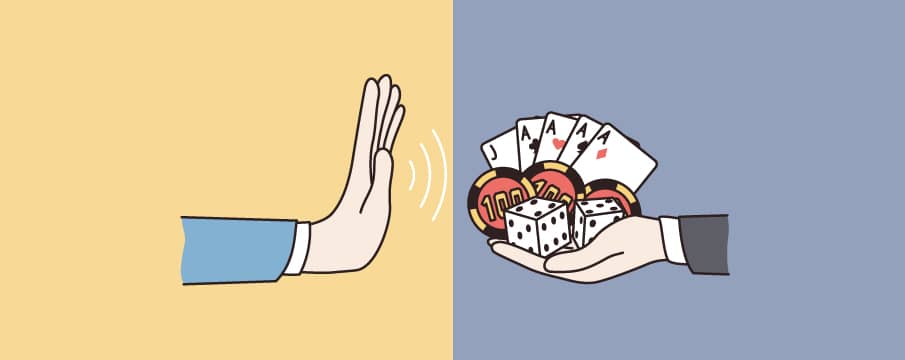- Home
- Gambling Rings: How They Operate and Why They Exist
Gambling Rings: How They Operate and Why They Exist

Illegal gambling exists despite law enforcement’s better efforts to the contrary. Gambling rings are popular in even high-risk jurisdictions where the law shows no leniency to illegal operations. Even in countries that regulate activities such as sports betting, illegal gambling rings find a way to be.
That begs the question of why. Police have expended no small efforts in cracking down on this type of business, but the truth remains that a criminal is always tempted by the high-reward value a gambling ring can bring him or her. However, this type of business is usually run by multiple individuals.
To better understand the nature of gambling rings and why they exist, we should first answer what they are.
Why Do Illegal Gambling Rings Exist?
Illegal gambling rings are high-risk and high-reward operations that take advantage of market demand and turn it in their favor.
In jurisdictions that fail to regulate specific aspects of the gambling experience, opportunistic criminals often show initiative and provide people with an alternative way to bet and gamble.
While gambling rings are subject to serious law enforcement action, the individuals behind them are usually tempted by the high-value potential. People who run such ventures often end up generating millions over the years.
That money is tax-free, which is an additional incentive to criminals, and often regular people end up trying to set up illegal gambling businesses too.
Having a closer look at the reason why such organizations exist, though, we have to consider the legal status of each jurisdiction.
The biggest gambling dens and rings are usually busted in places where gambling was illegal for decades, prompting people to get creative and set up these organizations.
Some have been going on for ten or even more years. So, it’s not just the fact that gambling rings were originally there to satisfy demand.
They have grown comfortable in their operations, deciding that the associated risks with running the business weren’t sufficient to stop them from pursuing a profitable business venture anyway.
That right there is the second reason why gambling rings exist today. They have grown comfortable with the setup.
As years have gone by, police have busted dozens of high-profiteering operations, but it has also revealed the weaknesses of such operations serving as an example to all the rest who have been lucky enough to dodge repercussions.
Not even the pain of a lengthy prison sentence is able to dissuade some individuals from going through with a gambling ring.
While this type of operation is usually the preserve of criminal groups, ordinary people with a knack and flair for gambling, and the right connections, may be easily tempted into running one.
After all, if you have done the daily fantasy sports at work, you may soon end up scaling up your operation.
How Are Illegal Gambling Rings Set Up?
The setup is ambitious as it’s complicated. To run a gambling ring successfully you need the right person for it. Shot-callers will bear the onus of the entire operation and potentially reap the fattest benefits.
They are the people who can keep their cool in difficult situations and understand how law enforcement works to counteract it. Once the right person is in position, he or she can then run through the rest of the details.
Sometimes a person would operate on their own if they have enough contacts and manage to keep customers coming back and interested.
Yet, most rings operate by creating a group of trustees who help manage the operations, accept bets and make sure to stay away from the public eye.
The organization’s HQ is not as important as long as it doesn’t call attention to it. Sometimes, a ring could just as well operate in prime venues precisely because nobody would suspect.
However, gambling rings are not about location. They are about building relationships with interested customers who will come back and stake their money. That is where things get tricky.
An illegal gambling business cannot advertise openly and rely on the same marketing ploys that ordinary and licensed businesses do.
That is why, to justify the amount of risk, people who run these rings are well-connected and can tap into a specific clientele who doesn’t mind the underhand nature of the operation.
After all, winning at a sportsbook is subject to tax, whereas a high roller’s motivation is to possibly avoid paying anything to the government on their winnings.
In any event, setting up an illegal gambling business right is crucial to its survival and longevity. However, police would definitely not turn a blind eye if they suspect someone trying to operate an illegal gambling den.
And make no mistake, if you run an illegal business, you will bear the stiffest penalties one way or the other.
What’s the Main Type of Illegal Gambling Ring?
Almost exclusively, gambling rings come down to one thing – sports gambling. There are some exceptions of course. In places like New York City, illegal games of poker have proliferated over the years.
One of the most remarkable stories is that of Molly Bloom, an underworld poker shot-caller who set up illegal games of poker for Hollywood stars and other celebrities who flocked to dingy places to play high stakes poker away from the public’s prying eye.
Poker has certainly had a reason to become a staple of gambling rings, but when you hear about a ring bust, your mind just defaults to sports gambling first.
Sports is much more popular than poker for once, and the activity was cooped up due to overbearing federal laws in the United States.
In places such as China, sports gambling is completely prohibited still, but China accounts for the biggest amount of sports bets placed, which means they are placed illegally.
Authorities in the country are not taking kindly to this form of activity though and they are actively arresting culprits, and even pursuing overseas criminals.
For all intents and purposes, illegal gambling rings will exclusively have to deal with sports and poker. Some casino parlors may be set up, but they are not really that popular or profitable.
While a poker room or a sportsbook can be easily shifted, running an underground casino is risky, expensive, and you can hardly vacate the premise if you get a tip that law enforcement is onto you.
At least that is the motivation of people who have explained why they had not chosen to run such a business but were caught for illegal sportsbooks or poker rooms instead.
Examples of Illegal Gambling Rings
Over the years, there have been some exciting illegal gambling ring busts and mostly in Asia where the sums have reached astronomical amounts.
There are at least several noteworthy examples of illegal gambling rings today that were able to secretly generate eye-popping revenue and went undetected for years.
Vietnam’s $2.6bn Gambling Bust
In May 2020, Vietnamese police busted a $2.6 billion online gambling ring. Pent-up demand for gambling in Asia has made organized criminals bolder in the way they push their illegal operations.
Places such as Canada and the United States prefer a more discreet way of doing business whereas Asian gambling rings are adopting online technologies in a bid to reach millions of potential gamblers.
The $2.6 billion ring was running on a website called No Hu or “break the bank” when translated into English.
No Hu operated in both the digital and physical domains with the website’s “foot soldiers” located all over Hanoi, Vietnam’s capital, and always within reach to offer credit to players looking to play more.
The ring was active from 2018 through 2020 when Vietnamese police arrested 16 individuals and effectively ended the country’s largest gambling ring to date.
Seoul’s Notorious Gambling Den
Another example of a gambling ring is the one run in Seoul, South Korea. The gambling ring in Seoul operated between 2011 and 2017 when it was busted by police. Yet, figuring out the entire business wasn’t an easy task.
Police planted inside men who gradually worked their way up in the organization and figured out how it operated. It took years, though, as the gambling dens were continually shifting locations, without informing clients or trustees beforehand.
The insider team kept things pretty tight to the chest and managed to establish an operation that accepted $12 million in bets every day. The profits for the team weren’t too great, resulting in $5 million a year, but eventually, the ring had generated $25 million in the five to six years of its operations prior to law enforcement swooping in to put the crack on it.
Frank Rosenthal’s Gambling Operations
Remember when we mentioned that every gambling ring must have a shot-caller? Frank Rosenthal was born to play the part.
From an early age, Rosenthal was fascinated with sports and gambling, so much that he would drop anything he was doing to watch the Chicago Cubs play, a baseball team.
He was soon picked up by a group of shady individuals with ties to the Mafia who took to him and put him in charge of running various tasks at the sportsbooks for them.
It had mostly to do with tempting punters into unorthodox betting choices that were fixed by the people he ran with.
His success in compelling bettors to do his bidding soon moved him up the ladder and he became more involved with criminal syndicates that were effectively working to rig games.
Rosenthal was never apprehended or sentenced on any related charges, though, even though the man himself had a 300-page dossier compiled on him by the FBI.
Even though he appeared in court on several occasions, and most notably in front of the Gambling and Organized Crime subcommittee, he never shared any information with law enforcement.
In fact, he would even refuse to admit that he was left-handed, a stubbornness so admirable when the man’s nickname was “Lefty.” Anyhow, law enforcement failed to implicate Rosenthal on any charges.
A little tired from sports gambling, he moved on to casinos and ran four Las Vegas properties without proper documentation! When he tried to obtain a legal permit, he was shot down because of his past.
Right to his passing in Rosenthal, the man was an inspiration for the gambling world, even though he never actually played by the books.
However, whatever he was involved in, he was never afraid to step into the light or felt the need to hide.
Why Do Some People Use Gambling Rings?
The incentive behind running a gambling ring is evident. You stand to benefit from the operations significantly as an owner, generating millions of dollars a year and enjoying relative freedom for a few years before police finally catch up.
But what motivates people to turn to a gambling ring rather than sticking with the legal option of obtaining a license? Obviously, people who participate in high-stakes underground games of poker are the types of people who can afford the trip to Las Vegas or Atlantic City.
There are many factors that come into play here. People are just bored or they love the rush, or simply do not consider it a crime. However, some jurisdictions will still treat anyone participating in a game of poker, for example, as a criminal even if they are there to only play.
Some people are just old-timers who are very much used to playing privately or placing a bet with a sportsbook that was there long before the regulated gambling business took over. For some, the idea of not having to pay money on their winnings is a leading factor.
Others still turn to underhand gambling dens to place bets they couldn’t place elsewhere. It’s all about, as it were, a force of habit, which drives many people to stick with gambling rings they have come to trust.
That is not to say that you should, but it’s an interesting look into the psychology of people who choose to bet illegally.
Gambling Rings and Match Fixing: Are They Related?
Gambling rings are not just limited to accepting your bets without the proper licensing. They could be part of a criminal syndicate that specializes in not just collecting and running gambling operations, but also fixing sports games.
In fact, a criminal syndicate will always try to fix games. The threat of match-fixing is global and it’s not subsiding despite police forces’ better efforts. Syndicates have become adept at fixing games, too.
Today, match-fixing carries a stiff penalty, but this has not stopped these organizations from running both the bookmaking and fixing side of the business. The way these organizations operate is not simple and it’s difficult to get.
Fixers are constantly trying to get in touch with low-tier players from soccer through digital media. They use many complimentary gifts, such as lunches, dinners, and random gifts without expecting anything in return.
Syndicates have become sophisticated in tempting players into making the wrong choices in exchange for what is largely seen as nominal payment.
Match-fixing is a serious threat to the integrity of sports gambling and illegal rings are often tied to this type of activity.
Not always, though. Some of the biggest busts of gambling rings in the United States were run by people who had a knack for organizing the business side of things and were not associated with any sports leagues.
However, the fact remains that illegal gambling rings have a vested interest in finding a way to fix games and turn an even bigger profit. Whether all do is another matter altogether.
Should You Run an Illegal Gambling Ring?
No. There are a hundred reasons why you mustn’t. Gambling rings are illegal and while you may be tempted by the prospect of creating a ring to operate underhand gambling operations, the fact you are reading this article to inform yourself already proves that you do not have the right connections, upbringing, or knowledge to do so.
People like Rosenthal did not learn what they do by studying up on theory. They were there when it all began in the 1950s. Gambling rings today require connections, a certain penchant for taking risks, and ultimately the acceptance that sooner or later, you are going to go to jail.
Rosenthal’s story is unique and he did not get incarcerated, but he also had high-level connections and was smart enough to never leave a paper trail. Running a gambling business from your basement, on the other hand, makes you vulnerable to legal repercussions that could have life-long consequences.
What tempts the people who run illegal gambling businesses today you may wonder. They simply have the mettle and know-how to set up an operation. That doesn’t make it right though, nor is it an advisable career path.
Another reason why is that gambling is on its way to full legalization worldwide. In the United States, high stakes gambling across poker, sports, and casino is already happening completely above board and illegal gambling rings are seen as dinosaurs.
However, the most experienced ring leaders are able to overcome these challenges and create a sustainable business – at least for a few years. They all end up paying the price, though.
FAQ
It depends on the situation but yes, it can be deemed as a felony.
Most rings function by creating a group of trustees who help manage the operations, accept bets and make sure to stay away from the public eye. There is not necessarily a fixed physical location, the network is what is the core.
Anyone who is caught and convicted can face anywhere from 1-10 years in jail but the exact consequences can vary from state to state.
Luke is a media graduate who is looking to build upon his experiences from his strong love of sports betting and casino games which started during his first year of college. His fresh mindset always brings new content ideas to the team and his editorial skills will continue to grow with the help of the upper management team at GamblingNews.com.















